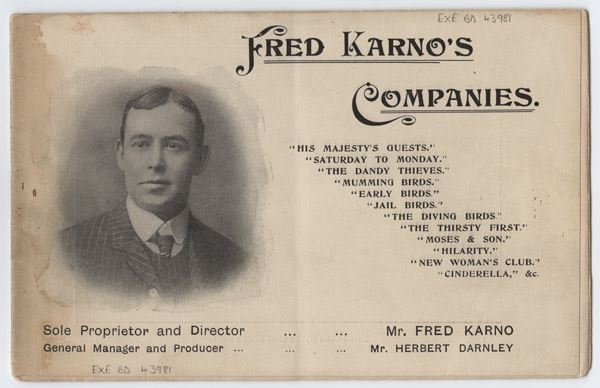Billy Bunter
Saturday 16th March 2024 9:27pm [Edited]
The Sussex Coast
4,908 posts
St Patrick's Day tomorrow!
Talbot O'Farrell (born William Parrott 27 July 1878) was billed as 'The Greatest Irish Entertainer of all time' but was actually born in Hull and created his Irish stage persona.
He sang in clubs and small halls in the north of England from the age of ten and then served in the Army during the Boer War. After leaving military service he worked as a policeman but continued to perform and made his first London stage appearance in 1902, billed as Jock McIver, "Scottish Comedian and Vocalist". In 1906 he performed as Will McIvor.
After several years of moderate success performing as Will (or Jock) McIver, he adopted the name Talbot O'Farrell, taking part of his stage name from his wife's maiden name. He cultivated an Irish accent and sang Irish songs, but his persona was the opposite of a stereotypical stage Irishman. He dressed in immaculate black coat, check trousers, waistcoat, white gloves, spats and grey silk topper and was dubbed. "The Irishman from Savile Row".:
He quickly became popular in London, singing mostly sentimental songs such as My Old Irish Mother:
www.youtube.com/watch?v=Bl5wjPAAa-o
and Your Dear Old Dad was Irish:
www.youtube.com/watch?v=3saiLvEd-OU
He held the record for most headlining appearances at the Victoria Palace Theatre, appeared in the 1925 Royal Variety Performance and toured the United States, Canada, Australia and South Africa.
He made a successful living prior to 1928, when he was worth £10,000 (equivalent to around £177,000 today), and in 1930 he served as 'King Rat' of the show business charity, the Grand Order of Water Rats. The worldwide depression severely reduced his income from the theatre and he was bankrupt by 1933. He acted in several films; including Born Lucky Rose of Tralee and Little Dolly Daydream In 1938, he appeared in two episodes of the BBC Television live variety show Cabaret. The following year he toured nationally in the show Their Names Made Variety, first performed at the Holborn Empire.
During the Second World War, he worked for the Entertainments National Service Association (ENSA) and, after the end of the war, he again toured as part of a variety package of old-time music hall stars in Thanks for the Memory. As part of the show, O'Farrell performed in the 1948 Royal Variety Performance.
He died at University College Hospital, London on 2 September 1952, aged 74.




